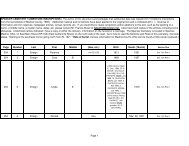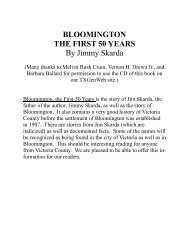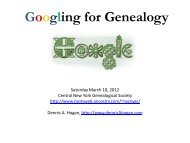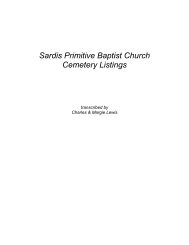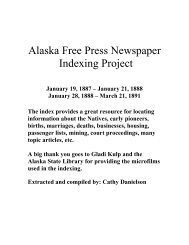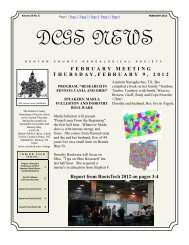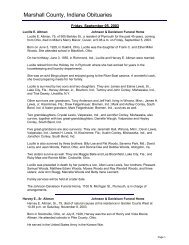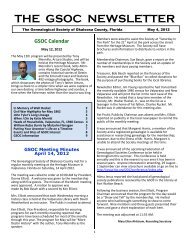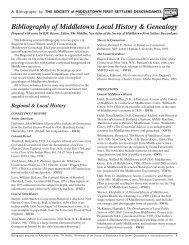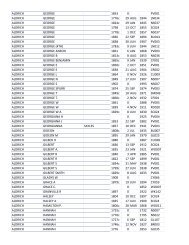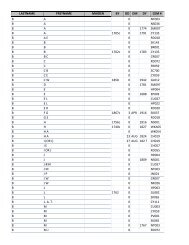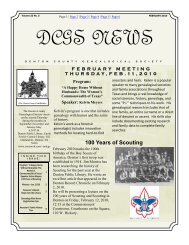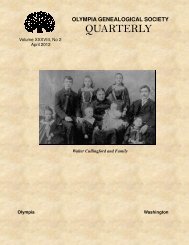Getting to the Roots of Your Family - RootsWeb - Ancestry.com
Getting to the Roots of Your Family - RootsWeb - Ancestry.com
Getting to the Roots of Your Family - RootsWeb - Ancestry.com
Create successful ePaper yourself
Turn your PDF publications into a flip-book with our unique Google optimized e-Paper software.
vestry, as representing <strong>the</strong> inhabitants generally, had <strong>the</strong> power <strong>to</strong> administer <strong>com</strong>mon<br />
property and <strong>to</strong> make by-laws on all matters <strong>of</strong> public concern.” 7<br />
The Vestry literally dealt<br />
with any issue any <strong>of</strong> <strong>the</strong> parish <strong>of</strong>ficers dealt with. Examples can be found in Vestry<br />
minutes <strong>of</strong> dealing with Sabbath observance, fees for burial in church, agreements with <strong>the</strong><br />
Overseers concerning care <strong>of</strong> <strong>the</strong> poor, bastardy agreements, providing <strong>of</strong> psalm singers, <strong>the</strong><br />
prosecution <strong>of</strong> felons and providing <strong>of</strong> beer; literally everything.<br />
Perhaps <strong>the</strong> most powerful <strong>of</strong> duties was <strong>to</strong> require <strong>the</strong> four key <strong>of</strong>fices <strong>of</strong> parish service –<br />
Churchwardens, Petty Constable, Surveyor <strong>of</strong> Highways and Overseers <strong>of</strong> <strong>the</strong> Poor – <strong>to</strong> have<br />
<strong>the</strong>ir expenditures brought before <strong>the</strong> Vestry for approval.<br />
Because <strong>of</strong> <strong>the</strong> broad ranging power, many vestries which began as “open” or including<br />
virtually any resident <strong>of</strong> <strong>the</strong> parish, evolved in<strong>to</strong> “select” vestries, which kept <strong>the</strong> power within<br />
<strong>the</strong> <strong>of</strong>fices noted above as well as <strong>the</strong> minister, parish clerk and wealthy land holders. In<br />
fact, Webb gives a fascinating description <strong>of</strong> Vestries and how <strong>the</strong> <strong>of</strong>ten “represented” <strong>the</strong><br />
people. He states:<br />
The so-called “Vestry” was, in fact, in no sense a body representative <strong>of</strong> <strong>the</strong><br />
population as a whole. It raised its revenues by direct taxation <strong>of</strong> its own<br />
members, and exercised by its expenditure au<strong>to</strong>cratic power in <strong>the</strong> details <strong>of</strong><br />
parish government, but it was, in its turn, subject <strong>to</strong> a very real, if somewhat<br />
spasmodic control at <strong>the</strong> hands <strong>of</strong> <strong>the</strong> squire, <strong>the</strong> parson, or o<strong>the</strong>r<br />
neighboring Justices <strong>of</strong> <strong>the</strong> Peace. Moreover, <strong>the</strong> <strong>of</strong>ficial relationships<br />
between <strong>the</strong> parties were inextricably woven in<strong>to</strong> <strong>the</strong> economic relationships<br />
that existed between <strong>the</strong> same individuals in <strong>the</strong>ir private capacities.<br />
The Justice <strong>of</strong> <strong>the</strong> Peace was probably <strong>the</strong> landlord <strong>of</strong> <strong>the</strong> whole <strong>of</strong> <strong>the</strong><br />
parish <strong>of</strong>ficers; <strong>the</strong> <strong>of</strong>ficers were <strong>the</strong> employers <strong>of</strong> <strong>the</strong> paupers; and even <strong>the</strong><br />
clergyman, who was in many respects <strong>the</strong> most independent person in <strong>the</strong><br />
village, <strong>of</strong>ten owed his position <strong>to</strong> <strong>the</strong> squire, let his glebe <strong>to</strong> <strong>the</strong><br />
Churchwarden, bargained with <strong>the</strong> Overseer as <strong>to</strong> <strong>the</strong> rates on his ti<strong>the</strong>s,<br />
and drew <strong>the</strong>se ti<strong>the</strong>s from every occupier <strong>of</strong> land in <strong>the</strong> parish. 8<br />
The effect this had on records is that <strong>of</strong>ten “<strong>the</strong>re were no minutes, no printed accounts and<br />
no reporters for <strong>the</strong> newspapers, <strong>the</strong> persons who paid <strong>the</strong> rates <strong>the</strong>mselves controlled every<br />
item <strong>of</strong> expenditure and knew everything that was going on.” 9<br />
As for <strong>the</strong> records kept, it was<br />
<strong>of</strong>ten <strong>the</strong> case (and you will notice as you search <strong>the</strong>m) that “parish account books, kept by<br />
successive Churchwardens or Overseers, and <strong>of</strong>ten containing <strong>the</strong> entries for a whole<br />
century, reveal, in inextricable confusion, <strong>the</strong> multifarious duties <strong>of</strong> <strong>the</strong> parish organization.<br />
7 ibid. Page 16<br />
8 Webb. Page 48.<br />
9 ibid. Pages 48-49.



